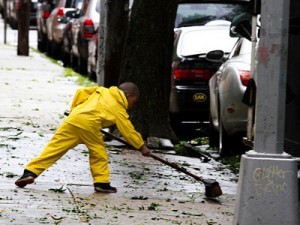Our popular business beat basics series is now available all in one place in ebook form for your convenience. Go here to download the Reynolds Center’s free ebook, Business Beat Basics.
***
I swore I would never write about insurance, but then there were the Florida hurricanes. Houses literally rotted a year later while insurers withheld checks, banking on a “tweak” in state law to get out of paying for storm-surge damage.
And there was the painful story of the mother whose daughter wasted away into the grave from anorexia, while her insurance company refused to allow continued psychiatric counseling. Insurers – lots of them nationwide – were using call-center “doctors” to dole out limited visits to mental health providers.
At Bloomberg Markets, David Evans found insurers giving life insurance beneficiaries a “checkbook” instead of a check, allowing insurers to pocket millions in unjust investment earnings. He made the story hit home by focusing on one particular group of beneficiaries: the survivors of fallen soldiers.
Time and again, the rewards for digging into an industry that won’t speak English, or wrestling with stubborn numbers in Excel, are some of the most compelling stories you could possibly find.
The trick is to see the human element buried within.
When James B. Steele and Donald L. Barlett wrote “Critical Condition,” they put a face on the plight of Americans without health insurance by showing a parade of community dinners for cancer victims and gas-station donation canisters for organ transplants. Steele said they found those telltale stories on Nexis, combining the search terms “medical bills” with “raffle” to troll through community newspapers.
The insurance beat also lies beneath just about any disaster, so be ready to roll after a storm, a tornado, a hurricane, an earthquake. Who is paying claims? Who is not? Are victims lost in limbo? Are they settling for less? Have scammers moved in to take advantage of the claims checks?
Biloxi’s Anita Lee scoured court filings looking for patterns of industry abuses. Steele suggests tapping community legal service offices, where uninsured people struggling with hospital bills they can’t pay turn up, and bankruptcy court, the recourse for employees struggling to collect on medical coverage after a local employer shuts down.
He adds, “The claims are all public and, in our wondrous age of the Internet, usually on line.”

If you are a local reporter, and there is a statewide property-insurance rate hike, find the impact in your community. (Hint: If regulators can’t tell you, ask to see the rate filing, and learn how to determine which territories cover your community.)
If you cover the statehouse, find stories by asking “Why?” on any bill dealing with insurance. Why should a certain medical treatment be exempted from routine coverage?
Insurance stories are even hidden in the company press release and the agency statement. A career can almost be made just by “truth testing” their claims.
And remember the most critical questions:
Who will be harmed?
Who will profit?










